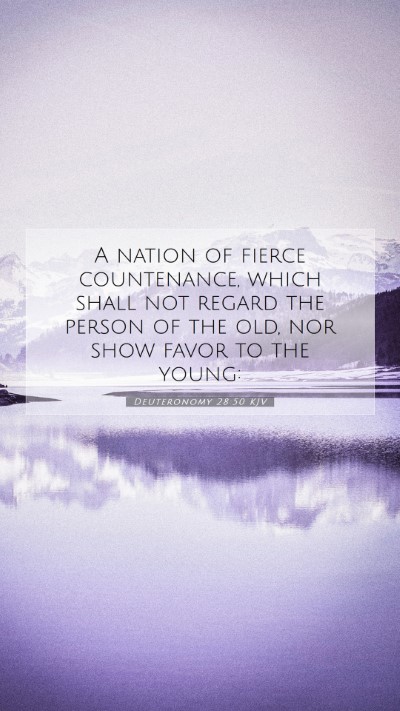Understanding Deuteronomy 28:50
Deuteronomy 28:50 states: "A nation of fierce countenance, which shall not regard the person of the old, nor show favor to the young." This verse serves as a strong warning and a prediction regarding the consequences of disobedience to God’s commandments, as articulated throughout the Book of Deuteronomy.
Bible Verse Explanations
To comprehend the depth of this verse, we must consider several key elements:
- Historical Context: This verse is situated within a broader section of blessings and curses that God lays out for the Israelites. It serves as a stark reminder of the potential consequences that would arise should they stray from their covenant with God.
- Symbolism: The term "nation of fierce countenance" denotes a foreign adversary characterized by ruthlessness and an absence of mercy.
- Moral Implications: The mention of not regarding the old or showing favor to the young highlights a complete lack of compassion and societal values, forewarning Israel of the moral decay that such disobedience could invite.
Bible Verse Meanings
Exploring the meanings of this verse provides profound insights that might transcend centuries:
- God’s Judgment: This scripture illustrates that failure to adhere to divine commandments leads to dire repercussions, including the rise of oppressive nations against them.
- Human Nature: The fierce countenance of nations reflects humanity’s propensity for violence and neglect toward the vulnerable, representing the consequences of sin.
- Mercy and Compassion: The verse indirectly admonishes the Israelites, urging them to cultivate mercy and compassion in their interactions, countering the fierce nature of the enemies foretold.
Bible Study Insights
For those engaging in bible study groups or online bible study sessions, this verse can be analyzed through various lenses:
- Comparative Analysis: Studying this verse alongside other prophetic warnings in scriptures can illuminate common themes of covenant faithfulness, blessings, and curses.
- Personal Application: Reflecting on how this verse applies to modern life can foster discussions on societal compassion and the moral responsibilities of individuals.
Bible Verse Commentary
Insights from noted commentaries provide additional layers of understanding:
- Matthew Henry: He interprets this verse as a premonition of judgment; Henry emphasizes that the wickedness of these nations contrasts sharply with the expected behavior of the people of God.
- Albert Barnes: Barnes emphasizes the ferocity and despair that accompanies foreign conquest and the implications of broken covenant with God, marking serious consideration for the readers.
- Adam Clarke: Clarke provides a historical perspective, noting that such nations would not possess the moral constraints typical of God’s people, showcasing a warning to the Israelites about potential ungodly influences.
Significance of Deuteronomy 28:50
This verse's significance can be outlined as follows:
- The assurance and alertness necessary for maintaining a covenant relationship with God.
- A reminder of the severe consequences of sin and rebellion against divine mandates.
- A call to uphold values of compassion and mercy in societies.
Related Bible Cross References
- Isaiah 47:6 - The prophecy against Babylon, which also reveals God’s judgment on the nations for their actions against His people.
- Ezekiel 5:11 - A depiction of the extremes of divine judgment due to Israel's unfaithfulness, highlighting the fierce nature of the consequences.
- 2 Kings 25:3 - The historical account of the fall of Jerusalem and the merciless conqueror that illustrates the fulfillment of this warning.
Conclusion
In exploring Deuteronomy 28:50, we uncover complex layers reinforcing the critical need for obedience, illustrating the spiritual truths that remain relevant today. Understanding this scripture offers not just insights into the historical context but also prompts personal reflection on applying its lessons to modern living.
This verse serves as a powerful reminder of the potential outcomes of moral disregard and the imperative for us to engage deeply with our faith, fostering a society rooted in kindness and justice.


